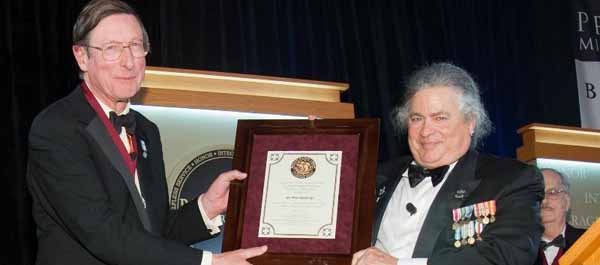An Award To An Outstanding Historian

In October I had the privilege of attending the annual event at which the Pritzker Military Library Lifetime Achievement Award for Military Writing is presented. This year’s award took place on Saturday, October 27, at the Chicago Hilton.
The PML Award is now in its sixth year and “recognizes a living author for a body of work dedicated to enriching the understanding of American military history including military affairs.” In 2013, for the first time, the award will go to a fiction writer whose body of work adheres to these high standards.
{default}As the 2011 recipient I had the honor of announcing on June 20 that Sir Max Hastings is the recipient of this year’s award. In addition to being honored at the annual gala the award also includes an honorarium of $100,000.
Hastings is a distinguished British military historian, newspaper editor, broadcaster, journalist and war correspondent. Journalism is something of a Hastings family tradition. His father, Macdonald Hastings, was also a well known journalist, magazine editor, author and war correspondent during World War II. His mother, Anne Scott-James, who lived to the age of 96, was an equally eminent journalist, author, columnist, and newspaper editor. Hastings’ grandfathers were both writers and his great-uncle was a poet and African hunter.
Educated at Oxford University, Hastings decided his future lay in journalism and after winning a fellowship from the World Institute Press worked in the USA in 1967-68, which led to the publication of his first book at the age of 23. Among his travels was coverage of the turbulent and violent 1968 Democratic National Convention in Chicago.
He spent a number of years as a foreign correspondent for BBC-TV and the London Evening Standard newspaper. In all Hastings has covered and reported on eleven wars including Vietnam and the Falklands war in 1982. Some years ago he related in a conversation with me what an enormous risk he took in deciding to accompany British forces to the Falklands. At the time it was uncertain how things would play out once they arrived in the South Atlantic, some 7,900 miles from England. Had there been no war, he would have spent months on a wild goose chase. Before departing England Hastings contacted the New York Times and offered to report the war for them as a stringer. The Times declined, a decision they no doubt came to greatly regret as no American journalist covered the war.
Once in the Falklands he accompanied the Parachute Regiment during the bitterest battles fought in the brief but intense war with Argentina in severely cold winter weather. His book about the campaign, The Battle for the Falklands (written with Simon Jenkins) was a best seller in 1983.
Hastings has received numerous prestigious awards, among them: the Somerset Maugham Prize in 1979 for his ground-breaking book, Bomber Command, the British Press Awards Journalist of the Year and Reporter of the Year in the 1982. In 1988 he was Editor of the Year while editor and editor-in-chief of the Daily Telegraph newspaper, a position he held from 1986 to 1995. Hastings went on to become the editor of the Evening Standard newspaper from 1996 to 2002.
His other awards are the Westminster Medal of the Royal United Services Institute for lifetime achievement to military literature in 2008 and the Edgar Wallace Trophy of the London Press Club, awarded in 2009.
Hastings is the current president of the 116-year old Edinburgh Sir Walter Scott Club, is also a Fellow of the Royal Society of Literature, an Honorary Fellow of King’s College, London, is the former president of the Campaign to Protect Rural England, and has received several honorary degrees from British universities.
In 2002, Queen Elizabeth II knighted Max Hastings for his services to journalism.
The highlight of the gala weekend in Chicago was an illuminating discussion between Sir Max and Pulitzer Prize-winning journalist and military historian, Rick Atkinson. Their discussion revolved around their experiences covering wars and the craft of writing. What emerged was what I’ve believed for many years, namely that good journalists make superb story tellers, which, as both agreed, is the key to not only good writing, but to engaging the reader. The list of eminent journalists who have produced great biography and history is long and includes William Manchester, Taylor Branch, William L. Shirer, and Jon Meacham. You can view a video of the interview between Sir Max Hastings and Rick Atkinson at
http://www.pritzkermilitarylibrary.org/Home/Attached.aspx
What makes Max Hastings special is his ability to describe not only the big picture across a wide canvas of an event such as World War II, but also to intimately focus on those who fought the battles and too often paid a terrible price. His latest book, Inferno: The World at War, 1939-1945, is a prime example. It tells the wide-ranging stories of everyday people on all sides of the conflict that was World War II. Inferno has been described as “elegantly written and cogently informed.” The book earned high praise from the NY Times Book Review as “new, original, necessary history, in many ways the crowning achievement of a life’s work.” It is all that and more. As a portrait of World War II as seen through the eyes of its participants it is an unrivaled story of history’s most devastating conflict.
Sir Max Hastings has made major contributions to history and his receipt of the Pritzker Award is a lasting testament to his superb accomplishments. For more than thirty-five years he has informed and entertained, and we are all richer for it.
A video of the Pritzker Military Library Lifetime Achievement Award ceremony can be viewed at

